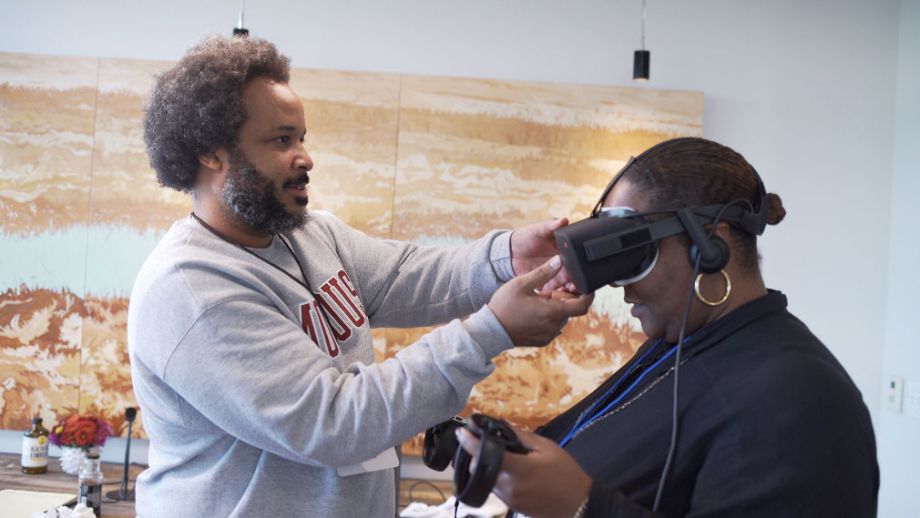EDITOR’S NOTE: This sponsored content is paid for by the Center for Cultural Innovation (CCI), as part of its AmbitioUS initiative. This series explores how alternative economic models can empower artists and culture bearers, with an eye toward financial freedom and long-term sustainability. You can find other stories in this series here.
When 2020 brought many of us to a rapid halt in our day-to-day life, one truth quickly emerged: Even in isolation, people did not stop creating, connecting or gathering, they just went about it differently (often wearing significantly comfier clothes). The COVID-19 pandemic gave a huge boost to existing — though not yet fully mainstream — forms of digital art and media, from augmented reality and virtual events to NFTs. In many cases, Black creators and artists have been at the forefront of that expansion.

Lauren Ruffin, co-founder of extended reality-focused worker-cooperative Crux, says the pandemic prompted a quick shift to their fundamental business model. Initially, Crux supported extended reality (XR) content creation from Black artists, from training to distribution. Shortly after COVID lockdowns, however, she found herself also getting approached by organizations needing to shift their programming to virtual, and Crux had a wide talent pool to pull from to make unique digital events happen.
“Crux has become a way to marry a highly skilled, talented group of cooperative workers with arts organizations and other institutions who need support digitally,” she says. Their work is clearly resonating—Crux did $350,000 in business in the last quarter of 2020 alone, partnering with organizations such as the New York Live Arts team and Black Public Media. Perhaps most notably, they worked on Points of View, a sci-fi virtual reality experience premiering at the 2021 Tribeca Film Festival’s Virtual Arcade Programming. The project aims to educate communities on the systemic threat of implicit bias in emerging technologies used by law enforcement.
The opportunity, however, also came with heavy responsibility.
“We were the only organization at the intersection of immersive XR and Blackness during an uprising last year,” Ruffin says. “It increased the value of our labor and our perspective, but that’s a really shitty way to get value… our growth is now forever tied to our trauma, and we have to figure out how to make sense of that growth because we want to be — we are — a joy organization.”
Ruffin says Crux is also focused on funding the co-op’s storytellers in developing their own intellectual property and nation within the burgeoning creator economy. Their top hurdle as they focus on growing their distribution platform for XR storytellers is figuring out new ways to monetize that work. Existing platforms that sell XR work, such as Facebook’s Oculus store, are extremely large, and in those platforms work by independent creators tends to get lost.
One solution that makes Ruffin and others in this space hopeful is non-fungible tokens, or NFTs, which enable Black creators to retain ownership over their digital creations and sell them to collectors directly, without having to rely on a big-tech middle-man to promote their work.
Essentially, NFTs are a cryptocurrency that certifies a digital asset, such as a video clip or piece of art, through a non-interchangeable blockchain. Think about the difference between a piece of physical art or a block of gold. A block of gold worth $100 could be exchanged for another block of the same value. The “non-fungible” in NFTs, however, means the item cannot be exchanged; it’s a one-of-a-kind digital creation. Collectors work in a similar fashion to collectors of physical art and tend to use the items in a similar way, too. Some just like owning them for the sake of collecting; others like to look at them or are exploring creative ways to display them.
San Francisco-based digital artist and Crux co-op member Mark Saab, like Ruffin, found that the past year spawned awareness of new digital tools, including NFTs, likely in part from people spending more time at home and online. He’s both purchased and sold many NFTs and anticipates their value will only grow. Beyond that, however, he sees it as a powerful new way of creating for Black artists that allows them to retain more ownership over both their art and their income stream.
“It’s a paradigm shift for digital artists, especially artists of color,” he says. “Before, if a brand reached out to you for a commission, that was pretty much how you made most of your money… you could sell digital art, but the market hadn’t matured enough where that would happen consistently.”
Now, however, Black creators are able to make art that they love and have a platform to sell it on, even if a brand isn’t interested in sponsoring the work. This has also spawned “collector downs,” where a group comes together to purchase something they wouldn’t have been able to individually. Saab points to one recent example of this where a Black female rapper whose art had long not received the respect it deserved received $11,000 for an NFT from a collector group.
In some cases, this also helps ownership of Black art stay in Black communities, helping put a dent in the extractive cycle of non-Black individuals profiting off the creativity of Black artists and stories. It also provides an opportunity for Black collectors to turn a substantial profit as the artists they patronize and NFTs themselves continue to rise in visibility.
“There’s a lot of power for artists, and especially for Black artists and creators of color, in that before we didn’t necessarily always get to think about, what we want to do, what works well, for us,” Saab says. “I know a lot of Black women in particular who felt like their art was undervalued for a long time. So that shift has been really powerful for me.”
Kelsey E. Thomas is a writer and editor based in the most upper-left corner of the country. She writes about urban policy, equitable development and the outdoors (but also about nearly everything else) with a focus on solutions-oriented journalism. She is a former associate editor and current contributing editor at Next City.
















